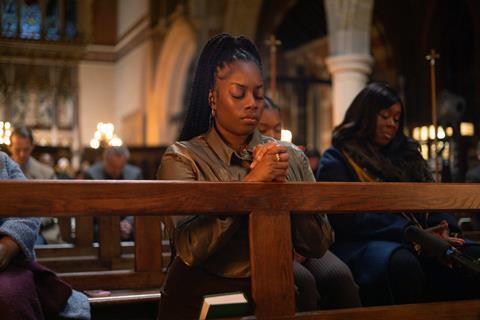Self-confessed ‘telly-addict’ Rev Bryony Taylor gives her review of Queenie, and says it reminded her that we are all just looking for acceptance.

I read Candice Carty-Williams’ novel Queenie when it was first published in 2019. It is a barnstorming book that dragged my Gen X self into the world of Gen Z (in other words, it made me feel a bit old!) The author herself has described the main character, Queenie, as the ‘black Bridget Jones’ and this is a good way to think of it.
Queenie is to current 20-somethings what Bridget Jones was to me in my twenties. The fun book about the life and loves of a young Jamaican British woman navigating adult life in London has now been adapted into a TV series, with the author heavily involved in its creation.
Queenie is to current 20 somethings what Bridget Jones was to me in my twenties.
I was delighted to see that the casting is excellent, Dionne Brown is great in the title role. It was also fun to spot comedian Llewella Gideon playing the Jamaican grandma (you might remember her from The Real McCoy) and Geoffrey from the Fresh Prince of Bel Air (Joseph Marcell) playing the grandad.
The casting and the script are very good; where the programme falls down a little is that it is sometimes trying to be all things to all people. Times when Queenie experiences racist micro-aggressions are often signposted a little too much – which can feel patronising. However, I can understand that they are trying to reach the broadest audience possible and that the Channel 4 setting will reach people that are hard to connect with in terms of raising awareness of the experiences of young black women; particularly in the world of work and relationships.
The series takes a little while to get going but after episode four (there are eight half-hour episodes all together) the story turns to look at how Queenie is trying to cope with the reality of a childhood trauma. She begins looking for attention and affection in all the wrong places. The story turns into one of redemption as Queenie spends some time discovering who the really important people in her life are – her family and her friends.
As Queenie begins to acknowledge her struggles and begins counselling I was touched by the scene when her Jamaican grandma, who is at first very opposed to counselling, ends up becoming the one who encourages Queenie to keep going with it when it gets tough.
Queenie’s family are churchgoers. There is an amusing scene when they attend Midnight Mass and Queenie decides to give prayer a try as nothing else has worked so far. Unfortunately, her prayer is followed by the last person she wants to see suddenly arriving at church and Queenie declares she will never pray again!
Read more on TV series
Why’s everyone naked on TV all the time? A Christian perspective on the au naturel telly trend
As an introverted Christian, the new series of Bridgerton speaks my language
Watching this as a Christian, though, it struck me how all of us are looking for acceptance and belonging and all of us have a habit of looking for that in the wrong places, especially if we have had bad experiences in the past. It is moving to watch the journey Queenie goes on which is a similar pattern for many of us, eventually discovering who we are meant to be, claiming our space in the world and prioritising our close relationships. There is a strong theme of forgiveness running through the story; it doesn’t provide a trite answer but perhaps one that is more real and more satisfying.
Queenie has been sold as a comedy, but it is more of a drama. If you watch it expecting a comedy you are likely to be disappointed, however, invest a bit of time in the show and you will be moved by the story and the messages it contains.
































No comments yet